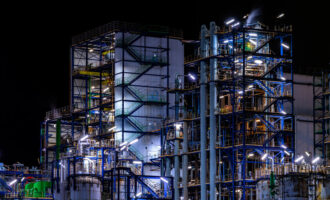
Advanced and future technologies: Avoiding the ‘Nokia effect’
In 2006, Nokia was the world’s most dominant mobile-phone manufacturer. Over half of all profits in the mobile phone industry ended up in the company’s pockets and, the low-end Nokia 1600 series mobile phones sold a staggering 130 million units worldwide.
Fast forward to 2013 and Nokia held a paltry 3% of the global smartphone market and its market cap had imploded to a fifth of what it was in 2007. Once the darling of the mobile industry, Nokia was at risk of disappearing — not just from relevance, but altogether. HMD Global, who since December 2016 has held a licensing agreement for the Nokia brand for mobile phones, has staged somewhat of a comeback though it remains to be seen whether the former powerhouse will ever become a central player in the mobile market again.
What does this have to do with the fuels and lubricants market? Stick with me for a moment, it will soon become clear!
 The catalyst for Nokia’s decline is no secret. Steve Jobs launched the first generation of Apple’s “breakthrough Internet communications device” in 2007, with innovative features such as a touchscreen interface, virtual keyboard, and the internet in your pocket. Over the next few years, Apple (and subsequently Android) crushed Nokia. Despite Nokia’s scale, capability, and vast spending on research and development, the company failed to adapt. The company underestimated the importance of the transition to smartphones and were seemingly reluctant to shift into a new era.
The catalyst for Nokia’s decline is no secret. Steve Jobs launched the first generation of Apple’s “breakthrough Internet communications device” in 2007, with innovative features such as a touchscreen interface, virtual keyboard, and the internet in your pocket. Over the next few years, Apple (and subsequently Android) crushed Nokia. Despite Nokia’s scale, capability, and vast spending on research and development, the company failed to adapt. The company underestimated the importance of the transition to smartphones and were seemingly reluctant to shift into a new era.
Meanwhile, Apple sold more than one billion iPhones globally from 2007 to 2017. Less well documented is the colossal impact this disruptive technology had on seemingly unrelated or auxiliary business lines such as maps, clocks, cameras, calendars, and more. Even gum sales, would you believe? According to market research firm Euromonitor International, smartphones have contributed to a 15% decline in gum sales since 2007! Apparently, we are so consumed with our phones, we no longer reach for an impulse purchase at checkout to curb our boredom. This disruptive technology has impacted the world in more ways than anyone could have predicted in 2007.
The fuel and lubricant industries feel a little like we are in our own “early-iPhone” era. Significant market uncertainty is evident with a range of disruptive technologies on the horizon, yet the impacts of these looming changes on our businesses are not well-defined. What is clear is the need to keep pace with technological change to avoid becoming the Nokia equivalent of the fuels and lubricants industry. Failure to innovate, failure to match changes to customers’ wants and needs, or to adjust to political movements and economic change could be catastrophic.
 In March 2019 individuals and companies from throughout the globe will converge on F+L Week 2019 at the Grand Hyatt Singapore to discuss “Advanced and Future Technologies — 2020 and Beyond.” The 2019 event will be the 25th installment of F&L Asia’s unique undertaking to gather leading businesses in the fuels, lubricants, base oils and additives sector in Asia to discuss current industry trends and issues once a year which began at the Shangri-La Rasa Sentosa Resort in Singapore in 1995.
In March 2019 individuals and companies from throughout the globe will converge on F+L Week 2019 at the Grand Hyatt Singapore to discuss “Advanced and Future Technologies — 2020 and Beyond.” The 2019 event will be the 25th installment of F&L Asia’s unique undertaking to gather leading businesses in the fuels, lubricants, base oils and additives sector in Asia to discuss current industry trends and issues once a year which began at the Shangri-La Rasa Sentosa Resort in Singapore in 1995.
As we approach our own eureka moment, F+L Week continues the tradition, by creating an opportunity for the industry to gather much-needed market insights from industry experts assembled from all corners of the world. Next year’s event should prove even more advantageous as F+L Week partners with the Asian Lubricant Manufacturers Union (ALMU) to bring you not one, but two world-leading events in the same location. The inaugural ALMU Annual Meeting & Global Leadership Summit will run parallel to F+L Week, the associated events to be held on 4-7 March 2019.
F&L Asia’s conference team is already working on the event programming. An “Advanced and Future Technologies” session will be chaired by Ford Motor Co.’s Technical Expert in Powertrain Research and Advanced Engineering Dairene Uy and will include a variety of highly anticipated topics. Andreas Pungs, managing director of FEV (Thailand) Co., Ltd will present “Future Vehicle and Powertrain Outlook: Focus on Asia,” highlighting the challenges associated with the design and development process of next-generation clean and (fuel) efficient vehicles. Pungs will cover several variables including the level of electrification, powertrain architecture options, the impact of advanced driver-assistance systems/autonomous driving, shared mobility, and also the continuous improvements made in the conventional combustion engine, transmission, and driveline technologies. Pung’s presentation will focus on the Asian markets and corresponding local consumer behaviour.
 Off-road engines are exposed to unique technical challenges not seen on-highway due to a relatively high load factor or severe duty cycle, compounded with a lack of airflow cooling for slow-moving or stationary machines, moisture and debris contamination, excessive vibration and shock loading, as well as broad application range. Kenneth K. Chao, Sr. staff engineer, Lubricants, at John Deere Product Engineering Center, will elaborate on the various aspects of off-road engine application and the associated tribology, in his presentation entitled “On-Highway Versus Off-Road Engine Applications and Lube Requirements.”
Off-road engines are exposed to unique technical challenges not seen on-highway due to a relatively high load factor or severe duty cycle, compounded with a lack of airflow cooling for slow-moving or stationary machines, moisture and debris contamination, excessive vibration and shock loading, as well as broad application range. Kenneth K. Chao, Sr. staff engineer, Lubricants, at John Deere Product Engineering Center, will elaborate on the various aspects of off-road engine application and the associated tribology, in his presentation entitled “On-Highway Versus Off-Road Engine Applications and Lube Requirements.”
The latest China VI represents one of the most stringent emission regulations in the world. Junmin Zhao joined Lubrizol China in 1998 and is now the regional business manager for Engine Oils, boasting more than 18 years’ experience in engine oil additive marketing, technology and product development. Zhao will deliver a presentation on “The significant challenges for the China Lubricant Market in the China 6 era.”
Andre Swarts, principal engineer, Advanced Powertrain and Emissions at the Southwest Research Institute (SWRI) in San Antonio, Texas, U.S.A., holds a doctorate in mechanical engineering from the University of Cape Town in South Africa, and has published more than 20 technical papers. Swarts will present on the topical issue, “Taking Stock of Low Speed Pre-Ignition (LSPI)” Swarts manages the Advanced Engine Fluids program at the world famous SWRI and is involved in projects that range from research into LSPI to fuel and lubricant impacts on engine efficiency and emissions reduction.
Changes in the regulatory landscape are highly influential on future products and services and their speed of change. Patrick Brutto, certified metalworking fluid specialist (CMFS) with the Society of Tribologists & Lubrication Engineers (STLE), will chair a session entitled “Regulatory Impact Current and Future: The Asia Pacific Industrial Lubricants Market.” The session will cover topics such as an industrial lubricants overview, country-specific and regional regulations and their impact on industrial lubricants and raw materials, overseas regulations and the regulatory horizon from 2020-2030 and its Impact on industrial lubricants.
Among the confirmed speakers are Daniel E. Sullivan, Houghton International Inc.’s corporate product stewardship — senior regulatory affairs analyst. Sullivan will present on “Practical Experience and Issues Associated with Chemical Registration of Formulated Products in Asia-Pacific Countries.” SI Group’s Senior Technology Manager, Glenn Kenreck, will discuss “Regulatory Factors Impacting Lubricant Additive Technology Innovation.”

Brutto will also share his expertise in metalworking fluids (MWF), with a pre-conference educational workshop on 4 March 2019 focused on “Water-Dilutable Metalworking Fluids: Reducing the Risk of Failure.” The workshop will provide participants with an improved understanding of water-dilutable MWFs, why they fail, and ways to minimize the risk of failure.
Edward Becker, a past president and Fellow of the Society of Tribologists and Lubrication Engineers, will deliver “A Short Course in Automotive Tribology.” This educational workshop will take place on 5 March 2019 and will draw on Becker’s 30+ years of experience at General Motors, up until his retirement, mostly in the Powertrain division.
A session themed “Electric Vehicles: Impact on Fuels & Lubricants” will feature multiple presentations dedicated to the impact new powertrains will have on automotive fuels and lubricants. Ki-Joon Kim, principal transport specialist, Transport Sector Group, at the Asian Development Bank (ADB), will draw on learnings from ADB’s recent electric vehicle research to present a paper on “E-Mobility Policy and Strategy for ADB Developing Member Countries.”
Session Chairman K.K. Gandhi is an automotive and fuel expert, and principal adviser with the Society of Indian Automobile Manufacturers (SIAM) in New Delhi, India, since 1 April 2018. He was previously SIAM’s technical director until his retirement.
The ever-popular “SAE Asian Steering Committee Colloquia” will be chaired by Naren Patil, Lubrizol’s regional business manager for Engine Oils, Asia Pacific, and will include presentations on JASO’s ultra-low viscosity passenger car motor oil (PCMO) specification, India’s Bharat Stage VI (BS VI) emissions regulation, proposed changes to the JASO four-stroke motorcycle oil (MCO) specification, as well as other upcoming industry specification changes.
Other confirmed speakers for the plenary session include Markus Scherer, director of Global Marketing Base Oils & Metalworking, BASF, who will present on “Novel Fuel and Lubricant Components for a Sustainable Future.”
We look forward to announcing the full list of speakers soon. Visit www.fuelsandlubes.com/flweek Edward Becker for the latest information.








